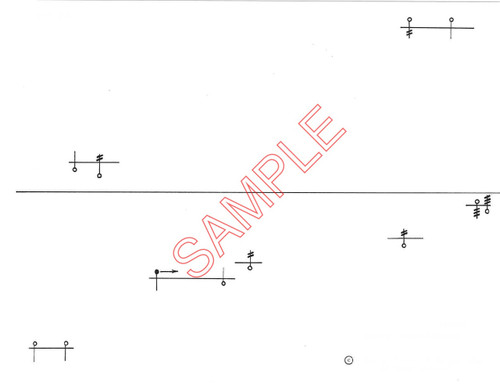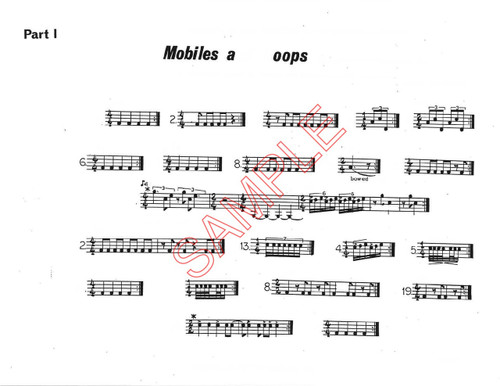Fulkerson, James
James Fulkerson was born in Streator, Illinois (USA) in 1945 and received his musical training at Illinois Wesleyan University and the University of Illinois. His major compositional studies were with Wilbur Ogdon, Salvatore Martirano, Kenneth Gaburo, Lejaren Hiller, Ben Johnston, and Herbert Brün. Principal trombone studies were with Carmine Caruso and John Silber, additional studies with Donald Reinhardt, Robert Gray, Donald Miller, Edward Kleinhammer, and Ernst Giehl.
Upon completion of his studies, Mr. Fulkerson became resident as a composer-performer at the Center for the Creative and Performing Arts in Buffalo (New York). He has spent periods as composer-in-residence with the New York State CAPS Program, the Deutscher Akademischer Austausdienst (Berlin), The Victorian College of the Arts (Melbourne, Australia), Dartington College of the Arts (Totnes, Devon UK), and The School for New Dance Development (Amsterdam., NL). He has taught composition at Dartington College of the Arts, the University of Nottingham (where he was also Director of the Computer and Electronic Music Studios and the Leverhulme Research Project in Computer Music) and the European Dance Development Center (Arnhem, NL).
He has composed extensively for various media especially experimental film and new dance. His music has been performed throughout the world and is recorded on Folkways, Irida, Move Records, Attacca Babel and Etcetera Records. His music is published by Edition Modern (Karlsruhe), Seesaw Music (NY), and Donemus (Amsterdam).
As a trombonist, he has always been associated with performing and championing experimental music and experimental composers. Over 150 solo works have been composed for him, including two works by the American composer John Cage. He has recorded for Deutsche Gramophone, Nonesuch Records, Lovely Music, Attacca Babel, Mode Records and Etcetera Records. He has made complete solo CDs of music by John Cage (Etcetera Records KTC 1137) and Christian Wolff (Etcetera KTC 1227) as well as his own Force Fields and Spaces) (Etcetera KTC 1175).
In August, 1989, he founded The Barton Workshop:
The Barton Workshop is an Amsterdam based ensemble founded in 1989 by American composer-trombonist James Fulkerson. The goal of the ensemble is to perform the leading edge of contemporary music, whether notated or not. The workshop primarily creates "composer portrait" concerts, usually in collaboration with the composers, which provide either an overview or an in-depth representation of a chosen composer's work. The Barton Workshop has collaborated with composers such as Alvin Lucier, Christian Wolff, Nicolas Collins, and Frank Denyer and given world and European premieres of works by Galina Ustvolskaya, Henryk Gorecki, Alvin Lucier, James Fulkerson, Jerry Hunt, Frank Denyer, Nicolas Collins and others.
On the 2nd and 4th Monday of each month during the concert season from December, 2000 until February, 2006, The Barton Workshop presented a 2 hour concert/webcast (The Workshop/Maximum Clarity )featuring experimental music and solo improvisation in Zaal 100, (Amsterdam).
The discography of The Barton Workshop includes: (all produced and edited by James Fulkerson)
The Barton Workshop Plays John Cage, 3 CD (1992) Etcetera KTC 3002
The Ecstasy of the Moment, Morton Feldman, 3 CD set (1998) Etcetera KTC3003
Works for Trombone, Christian Wolff (2000) Etcetera KTC 1227
Works for Trombone, John Cage (1992) Etcetera Records 1137
Force Fields and Spaces, James Fulkerson (1994) Etcetera 1175
40 ROOMS, Alvin Lucier, Renssalear Polytechnic, iEAR Studios CD-ROM, (1998)
I Like to Think of Harriet Tubman, Christian Wolff (1999) Mode 069
Finding Refuge in the Remains, Frank Denyer (1999) Etcetera KTC 1221
Composer Portrait, Jos Kunst, (2003) MuziekGroepNederland
The Barton Workshop Plays Galina Ustvolskaya (1993) Etcetera KTC 1170
Morton Feldman: Voices and Instruments (Mode Records, 2002) Mode 107
(Re):Making Music Christian Wolff (2 CD set) Mode Records
Composing by Numbers, Morton Feldman - Mode Records (Volume 1) - Mode 146
The Fives (x), John Cage – Megadisc (België) – MDC 7815
Fired City, Frank Denyer – Tzadik Records (TZ 7082)
Chamber Works Jerry Hunt – Tzadik Records (TZ 7093)
Postal Pieces (2 CDs) :James Tenney – New World Records
Wood-Stone-Desert: James Fulkerson FMR Records – 151-i0704
Faint Traces- Frank Denyer(Mode151CD)
Wind Shadows - Alvin Lucier - 2 CD Project (New World Records, 80628)
Eight-Two- One4 - John Cage (Megadisc Records) MDC 7803
FOURTEEN-SEVEN- TEN- THREE2 - John Cage (Megadisc Records) MDC 7801
Philip Corner –2 CD composer (New World Records 80659-2)
Melody, Ergodicity and Indeterminacy - James Tenney (Mode 185 CD)
Thirteen - Four6 - Four3 - John Cage (Megadisc Records) MDC 7799
Animating Degree Zero - James Mulcro Drew (New World Records 806872)
Spectra 1-8 – James Tenney (New World Records – 2 CD set – release in Oct 2009
CD/Recordings of Own Compositions:
First Chairs (Het Concertgebouw Orkest) Force Fields and Spaces, Part 1 – Jorgen van Rijen – Channel Classics 2005 – CCS SA 22305
James Fulkerson : Wood, Stone, Desert (2004) FMR Records 151-i0704 - includes a 45’ solo improvisation plus Wood, Stone, Desert
In the Same Breath (2006) Trio Improvisation CD – James Fulkerson, Mick Green, David Murphy - FMR Records CD208-0906
Nederlands Blazers Ensemble: In Shikara Tala - Force Fields and Spaces, Part I – 2002 – NBE CD009
Force Fields and Spaces Etcetera Records 1994 Etcetera 1175
Complete CD of Force Fields and Spaces
The Ladder of Escape 8: James Fulkerson Attacca Babel (1994)
Force Fields and Spaces, Part 1
Elective Affinities, III
WAP SOME’A DAT STUFF IN DE SUCKER ‘N NUKE IT (1991)
(Cassette) Arnhem – Hogeschool v/d Kunsten
James Fulkerson Irida Records 0017 (1980)
Suite for Solo Cello, Music for Brass Instruments, II, Antiphonies and Streams and Co-Ordinative Systems No. 10
Music from the VCA Move Records (1979)
Music for Brass Instruments, III
New Music/New York Folkways Records FTS 33902 (1973)
Patterns II and Patterns VII
* The point of The Workshop – which was informal – was to try out new projects, solos duos, trios (nothing larger than a quintet was envisioned), to perform small scale pieces by composers who interested us collectively or individually and to finish off each session with an improvisation by 1 or 2 players. This latter improvisation slot I entitled “Maximum Clarity”. This term differentiated between collective improvisation - which is the most common approach and which is done at a highly skilled level in the Netherlands - and the improvisational thinking of a single or pair of players, to try and achieve a clarity of personal musical thinking.
We invited interested players, ensembles and composers to come share their work with our audience. The idea was to provide an open laboratory or “workshop” to look at contemporary musical thinking and improvisation.






